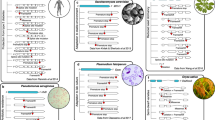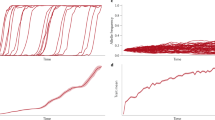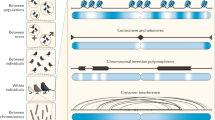Abstract
INTRAGENIC recombination between two different existing alleles in a population can create new alleles. The role of this process in maintaining variation in a natural population has been investigated1 by assuming that a gene consists of two sites, each of which can mutate to an infinite number of unique ‘alleles’ (the infinite allele model of Kimura and Crow2). Using this model it was shown that if the product of the population size, N, and the mutation rate, μ, is ⩾1, and the recombination rate, r, is the same order of magnitude as the mutation rate, then intragenic recombination significantly increases the number of alleles maintained in a finite population. Moreover, this is not equivalent to an increase in the mutation rate as the variance of homozygosity and the variance of the number of alleles are larger. This implies that the sampling theory of neutral alleles developed by Ewens3 does not apply to the situation where intragenic recombination is important in maintaining variation4. Application of these results to the study of intragenic recombination in natural populations would require a large number of independent samples in order to estimate the variance of homozygosity and the variance of the number of alleles. However, data from natural populations usually consist of the number of alleles and their frequencies in a single sample. Therefore, for the effect of intragenic recombination to be observable, there must be a detectable change in the distribution of the allele frequencies in a sample which contains k alleles. We present here the results of Monte Carlo simulation which show that intragenic recombination in the equilibrium population increases the frequency of the most common allele, increases the number of alleles which occur only once in the sample, and increases the homozygosity.
This is a preview of subscription content, access via your institution
Access options
Subscribe to this journal
Receive 51 print issues and online access
$199.00 per year
only $3.90 per issue
Buy this article
- Purchase on Springer Link
- Instant access to full article PDF
Prices may be subject to local taxes which are calculated during checkout
Similar content being viewed by others
References
Strobeck, C. & Morgan, K. Genetics 88, 829–844 (1978).
Kimura, M. & Crow, J. F. Genetics 49, 725–738 (1964).
Ewens, W. J. Theor. population Biol. 3, 87–112 (1972).
Kingman, J. F. C. Theor. population Biol. 11, 274–283 (1977).
Karlin, S. & McGregor, J. Genetics 58, 141–159 (1968).
Chovnick, A., Ballantyne, G. H. & Holm, D. G. Genetics 69, 179–209 (1971).
Coyne, J. A. Genetics 84, 593–607 (1976).
Singh, R. S., Lewontin, R. C. & Felton, A. A. Genetics 84, 609–629 (1976).
Watterson, G. A. Genetics 88, 171–179 (1978).
Author information
Authors and Affiliations
Rights and permissions
About this article
Cite this article
MORGAN, K., STROBECK, C. Is intragenic recombination a factor in the maintenance of genetic variation in natural populations?. Nature 277, 383–384 (1979). https://doi.org/10.1038/277383a0
Received:
Accepted:
Issue Date:
DOI: https://doi.org/10.1038/277383a0
This article is cited by
-
Two-dimensional leaf isozyme patterns of Aegilops kotschyi ’ Secale cereale amphiploids
Acta Physiologiae Plantarum (2004)
-
Genetic diversity of nuclear and mitochondrial genomes in Pinus parviflora Sieb. & Zucc. (Pinaceae) populations
Heredity (2003)
-
Multiple forms of inducible drug-metabolizing enzymes: A reasonable mechanism by which any organism can cope with adversity
Molecular and Cellular Biochemistry (1979)
Comments
By submitting a comment you agree to abide by our Terms and Community Guidelines. If you find something abusive or that does not comply with our terms or guidelines please flag it as inappropriate.



